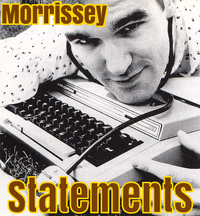Statement - true-to-you.net (November 6, 2011)
Summary
Morrissey verses NME, Tim Jonze, Merck Mercuriadis
Statement
Statement
At last week's court hearing Judge Tugendhat ruled in favour of Morrissey and against the NME in the NME's effort to prevent Morrissey taking them to court. The NME also wanted the Court to order Morrissey to pay over one hundred thousand pounds for their legal fees thus far, which was also unsuccessful. At the Application hearing, the NME were represented by a large number of lawyers, together with ex-editor Conor McNicholas. The NME's current editor, Krissi Murison, and Guardian music "writer", Tim Jonze, also provided written statements in support of the NME against Morrissey.
Strangely, and supported by the evidence of McNicholas, Murison and Jonze, the NME's lawyers argued that it would be unreasonable to expect them to remember the events of 2007, yet they went on to stress that if the case went to trial, they would wish to cross-examine Morrissey on events leading back not 3, but 19, years, to 1992, when the NME aggressively ran a "is Morrissey racist?" campaign.
In late 2007, Morrissey was interviewed by Tim Jonze for the NME with the promise from editor Conor McNicholas that the interview issue would include a free 7-inch single of Morrissey's version of David Bowie's "Drive-in Saturday". Both Morrissey and Tim Jonze were very pleased with the interview, which was very civil and courteous. Jonze immediately wrote to Morrissey's manager at the time (Merck Mercuriadis) saying that he found Morrissey to be "absolutely charming". In the midst of the exchange, McNicholas asked Morrissey to attend an NME Awards ceremony to collect a God-Like Genius Award. Morrissey politely declined.
Tim Jonze subsequently contacted Merck Mercuriadis in a rage, explaining that the NME editorial staff had taken his finished piece from him and had re-written it. Jonze explained that the re-write was unrecognizable from his original article, and that Jonze wished to entirely disassociate himself from the finished piece, and from the NME, leaving everyone with the clearest impression that he felt Morrissey had been treated very badly by the NME. When the interview appeared in print, Morrissey's replies and Jonze's questions had been altered, and the interviews heavily edited, in order to bring the issue of racism to the fore and to make Morrissey appear racist and hypocritical. In spite of Jonze's original outrage, he has now come out on the NME's side following legal proceedings being issued by Morrissey's lawyers.
Morrissey regrets the outcome of the interview with Tim Jonze, which only Conor McNicholas had the power to re-write. Morrissey believes that the NME's position is unsupportable, not least because the interview tapes exist and the printed interview transcripts exist and, on the examination of both, the conduct of the NME is there for all to see.
Furthermore, Morrissey's camp were subsequently told that following the printed interview, Conor McNicholas wrote to Love Music Hate Racism (on whom the NME had recently devoted an entire issue), and warned them that if they supported Morrissey in this dispute then they could forget about any further support from the NME.
Following the dismissal of the NME's Application, the Judge set a timetable for the case, which will now go to trial at the London High Court in 2012. Morrissey is represented by John Reid at Russells, and by David Sherborne.
Archived original post here.
